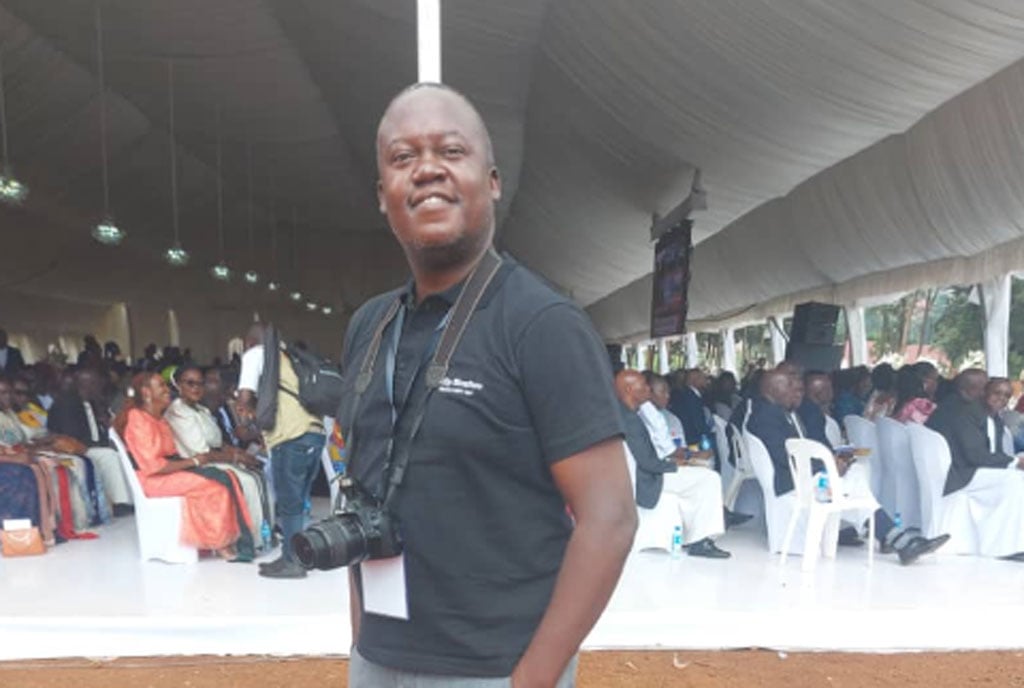Busoga records 11 cases of breast cancer among men

Executive Director Rays of Hope Hospice Jinja (RHHJ), Ms Sylvia Nakami (Left), RHHJ board chairman, Rev Canon Christopher James Kivunike, Deputy Director Jinja Regional Referral Hospital, Dr Afizi Kibuuka (in necktie) and Busoga East Police Spokesperson, Mr James Mubi, during the launch of the “Fight Women’s Cancer Event” in Jinja City on October 1, 2024. PHOTO/PHILIP WAFULA
What you need to know:
- “Cancer of the breast affects both women and men, and we encourage both sexes to do self-breast examination once in a month by looking out for any abnormal hard lump in the breast,” Ms Irene Naleba, a palliative care clinical officer.
About eleven men have breast cancer in Busoga Sub-region, according to Rays of Hope Hospice Jinja (RHHJ), the only specialised palliative care provider in Busoga Sub-region and parts of Buganda.
Palliative care provides holistic relief from symptoms and stress of serious life-limiting illnesses, aiming to enhance the quality of life for both patients and their families. It begins at diagnosis and continues throughout the illness.
Ms Irene Naleba, a palliative care clinical officer at RHHJ, says there are eleven active breast cancer cases among males in Busoga Sub-region and all are under their care.
“Eleven males have been diagnosed with breast cancer and are receiving treatment,” she said on October 1, adding that the patients are between the ages of 30 and 60 years.
According to Ms Naleba, unlike cancer of the cervix whose cause is known, breast cancer among males starts as a hard, painless lump at first that grows overtime and starts causing pain when it grows big.
“The difference is that it grows fast in women because of the hormones; otherwise, both undergo chemotherapy, surgery and radiotherapy.
“Cancer of the breast affects both women and men, and we encourage both sexes to do self-breast examination once in a month by looking out for any abnormal hard lump in the breast,” she added.
Ms Joanita Mbabazi, also a clinical officer at the same organisation, said cervical and breast cancers are the most common in the country.
“Last year, 227 cases of cervical cancer and 129 cases of breast cancer were recorded; overall, 61 percent of women are receiving palliative care for either cancer of the breast or cancer of the cervix,” she said.
Dr Margrethe Juncker, who has worked with RHHJ since October 2015, says since 2018, the organisation has screened over 11,000 women for cervical cancer, adding that on average, one in 16 women have either pre-cancerous changes or are suspicious of cancer.
In a bid to raise awareness, RHHJ, for the sixth year in the row, launched the “Fight Women’s Cancer Event” on October 1, under the theme: Detect. Treat. Defeat.
Throughout this month, information about breast and cervical cancer will be disseminated, climaxing with a run, walk and ride event on October 26, which is expected to gather over 1,200 participants.
The Executive Director RHHJ, Ms Sylvia Nakami, said they discovered that 60 percent of the cancers they were dealing with were breast and cervical cancer, and that is why they have launched the “Fight Women’s Cancer Event”.
“You can detect breast cancer early, while cervical cancer can be prevented, and also through screening, you can discover it a little early; that is why we want every lady in the region who is sexually active to screen,” Ms Nakami explained.
Ms Nakami said through research conducted last year, it emerged that people lack the right information, and that there is a lot of ignorance; so, the drive between now and the end of this month is to create awareness.
“Let people know that they can access early detection services and when they have a problem, they can access treatment as it really works because there is a myth that cancer never gets cured, but we have seen that when we take the patients on early diagnosis, they get cured,” Ms Nakami added.
Ms Florence Apio, a resident of Kinyala Village, Njeru Municipality in Buikwe District, said she has recovered from cancer of the cervix which was detected early. “I underwent radiotherapy for 25 days and chemotherapy for four weeks until I felt better,” she said in a brief testimony.
The deputy director Jinja Regional Referral Hospital, Dr Afizi Kibuuka, said the commonest male cancers they record are the cancer of the prostate, and appealed to men above 50 years to go for screening. For the women, he cited cancer of the cervix as the commonest.
Dr Kibuuka added that breast cancer also affects the men, but when it does, it is very evasive and appealed to men to check their breasts.
“If you find any hard mass in your breast which is moving, make sure you visit our hospital for screening as early as possible,” said Dr Kibuuka.





